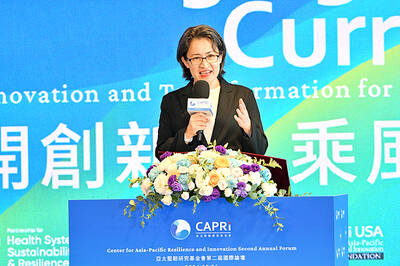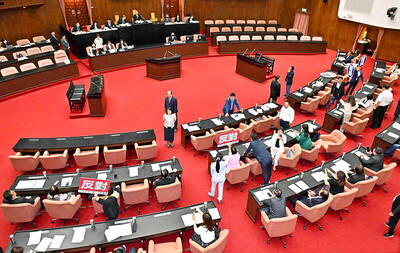The government yesterday had a surprise change of heart, declaring an initiative to put the controversial Fourth Nuclear Power Plant to a national referendum.
After a meeting with Chinese Nationalist Party (KMT) officials and lawmakers yesterday, Premier Jiang Yi-huah (江宜樺) said: “The ultimate decision on this issue of major concern to people’s lives and security, and to the nation’s economic development in the future, shall be decided through a referendum.”
The decision was reached at a meeting presided over by President Ma Ying-jeou (馬英九) at the Presidential Office on Sunday night and attended by Jiang, Minister of Economic Affairs Chang Chia-juch (張家祝), party officials and several KMT lawmakers.
Jiang said that the government maintains its position that construction of the plant should be completed, but it will not operate commercially unless it is safe.
However, “we would like to face public scrutiny through a referendum,” he said.
According to the plan, a referendum on halting construction of the Fourth Nuclear Power Plant will be initiated by the KMT caucus tabling a motion next month in the legislature, KMT caucus whip Lai Shyh-bao (賴士葆) said.
Lai said the plebiscite could be held in August as the Referendum Act (公民投票法) stipulates that a referendum must be held no sooner than one month and no later than six months after its proposal.
If the completion of the plant failed to win approval, there was the risk of huge compensation payouts for breach of contract, higher electricity costs, power shortages and even an adverse effect on economic growth, Jiang said.
Nevertheless, “we would accept the ultimate decision made by the people,” he said.
Since 1992, when the first budget for the plant cleared the legislature, NT$264 billion (US$8.9 billion) has been poured into the project, with NT$19.7 billion requested in this legislative session, which begins today, and a budget of NT$40 billion needed to complete its construction.
State-owned Taiwan Power Co (Taipower, 台電), the builder and operator, originally planned to apply to the Atomic Energy Council (AEC) to load fuel rods in the plant’s first reactor in February next year and to begin commercial operations in October 2015.
The Fukushima Dai-ichi nuclear power plant incident of 2011 in Japan has re-energized Taiwan’s anti-nuclear movement, with the Fourth Nuclear Power Plant the focus of attention.
A number of flaws in the design and construction of the plant have been identified. Adding to safety concerns over nuclear power plants in Taiwan is the fact that they are situated in geologically unstable earthquake-prone areas.
Since the Referendum Act was enacted in 2004, there have been six national referendums, all held on the same day as national elections — March 30, 2004, a presidential election; January 12, 2008, a legislative election; and March 22, 2008, a presidential election.
There were two referendums on each date, but none of the proposals in the referendums passed due to what is perceived to be the high threshold for them to be successful.
That referendum act requires more than half of eligible voters to cast ballots for a poll to be valid.
Elizabeth Sun (孫又文), a spokeswoman for Taiwan Semiconductor Manufacturing Co (TSMC, 台積電), the world’s largest contract chipmaker, said that while it did not take sides on the matter, the government should ensure that industry would be able to enjoy stable and adequate power supplies.
TSMC would not comment on whether the issue should be resolved via referendum.
Contract chipmaker United Microelectronics Corp (聯電) said that the most important issue was ensuring sufficient power supplies.
Additional reporting by Lisa Wang

NO-LIMITS PARTNERSHIP: ‘The bottom line’ is that if the US were to have a conflict with China or Russia it would likely open up a second front with the other, a US senator said Beijing and Moscow could cooperate in a conflict over Taiwan, the top US intelligence chief told the US Senate this week. “We see China and Russia, for the first time, exercising together in relation to Taiwan and recognizing that this is a place where China definitely wants Russia to be working with them, and we see no reason why they wouldn’t,” US Director of National Intelligence Avril Haines told a US Senate Committee on Armed Services hearing on Thursday. US Senator Mike Rounds asked Haines about such a potential scenario. He also asked US Defense Intelligence Agency Director Lieutenant General Jeffrey Kruse

INSPIRING: Taiwan has been a model in the Asia-Pacific region with its democratic transition, free and fair elections and open society, the vice president-elect said Taiwan can play a leadership role in the Asia-Pacific region, vice president-elect Hsiao Bi-khim (蕭美琴) told a forum in Taipei yesterday, highlighting the nation’s resilience in the face of geopolitical challenges. “Not only can Taiwan help, but Taiwan can lead ... not only can Taiwan play a leadership role, but Taiwan’s leadership is important to the world,” Hsiao told the annual forum hosted by the Center for Asia-Pacific Resilience and Innovation think tank. Hsiao thanked Taiwan’s international friends for their long-term support, citing the example of US President Joe Biden last month signing into law a bill to provide aid to Taiwan,

China’s intrusive and territorial claims in the Indo-Pacific region are “illegal, coercive, aggressive and deceptive,” new US Indo-Pacific Commander Admiral Samuel Paparo said on Friday, adding that he would continue working with allies and partners to keep the area free and open. Paparo made the remarks at a change-of-command ceremony at Joint Base Pearl Harbor-Hickam in Hawaii, where he took over the command from Admiral John Aquilino. “Our world faces a complex problem set in the troubling actions of the People’s Republic of China [PRC] and its rapid buildup of forces. We must be ready to answer the PRC’s increasingly intrusive and

STATE OF THE NATION: The legislature should invite the president to deliver an address every year, the TPP said, adding that Lai should also have to answer legislators’ questions The Chinese Nationalist Party (KMT) yesterday proposed inviting president-elect William Lai (賴清德) to make a historic first state of the nation address at the legislature following his inauguration on May 20. Lai is expected to face many domestic and international challenges, and should clarify his intended policies with the public’s representatives, KMT caucus secretary-general Hung Meng-kai (洪孟楷) said when making the proposal at a meeting of the legislature’s Procedure Committee. The committee voted to add the item to the agenda for Friday, along with another similar proposal put forward by the Taiwan People’s Party (TPP). The invitation is in line with Article 15-2